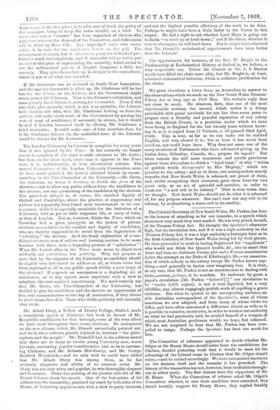The Colonial Secretary of New South Wales, Mr. Parkes, has
done us the honour of attacking us for our remarks, in a speech which shows how very much they were needed. He was very proud, he said, of the Treason-Felony Act. He thought the Spectator's character high, but its circulation low, and if it was a high authority on the Treason-Felony Act, it was a high authority a fortnight later as to the Irish Catholics of New South Wales being led by their priests. He then proceeded to exult in having frightened the "vagabonds" who would not drink the Queen's health, &c., also to assert that there had been an elaborate Fenian plot and a Fenian assassination before the attempt on the Duke of Edinburgh's life,—an assassina- tion of which nobody in the colony except Mr. Parkes knows any- thing,—and generally to hector over imaginary foes. It is clear, at any rate, that Mr. Parkes is not an accurate man in dealing with facts,—unless, perhaps, it be murders. To underrate by guess a paper's circulation (Mr. Parkes "believed [!]" our circulation to be "under 3,000 copies), is not a very dignified, but a very childlike, nay, almost engagingly pettish mode of repelling a grave criticism. But when he quoted to his unsuspecting audience an able Australian correspondent of the Spectator's, none of whose assertions we ever adopted, and from many of whose views we differ, and have often announced a difference almost as wide as it is possible to conceive, as our own, in order to weaken our authority on what we had previously said, he availed himself of a weapon of which most Australian gentlemen would, we hope, feel ashamed. We are not surprised to hear that Mr. Parkes has been com- pelled to resign. Perhaps the Spectator has been too much for him.






























 Previous page
Previous page